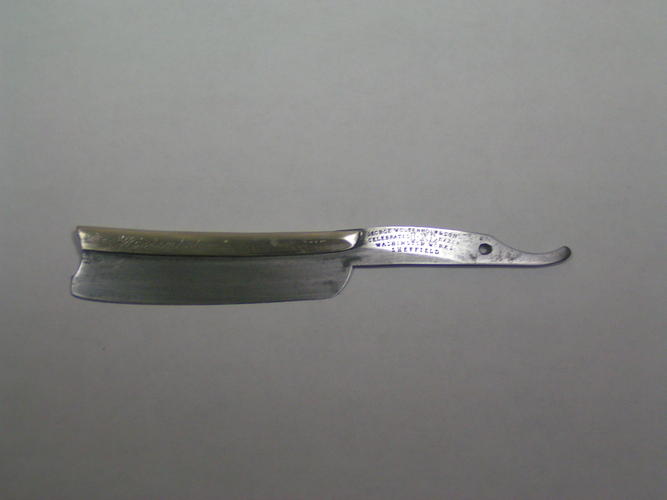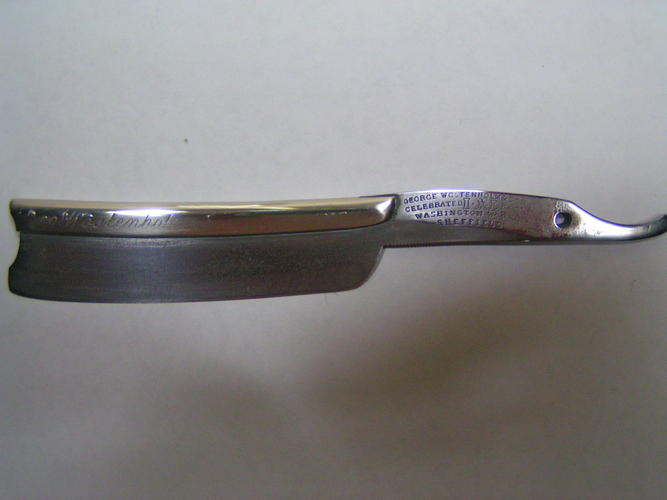Results 21 to 30 of 74
Thread: electrolysis for rusty razor
-
09-20-2012, 10:09 PM #21Senior Member


- Join Date
- Dec 2011
- Location
- I'm Gonna Spend Another Fall In Philadelphia
- Posts
- 1,999
Thanked: 498
-
09-21-2012, 01:34 AM #22

Neither snow nor rain nor heat nor gloom of night stays me from the swift completion of my appointed tinkering. I WILL find a better way or screw the pooch and start all over again. I'd rather think of it as determined rather than stubborn. Maybe even "visionary" could be used!

Thank you for your donation. I really do appreciate it. If I have enough donations, I can try different voltage and amperage settings to see how they affect the outcome. I can also try different electrolytic compounds and see if one works better than another. But I need blades to experiment upon. Glen was looking through his rummage pile and I hope he will come through with some donations. Any other donations will assist in this experiment.
Thank you Kemosabe.
Randy“Tell me and I forget. Teach me and I remember. Involve me and I learn.” Ben Franklin
-
09-21-2012, 02:46 AM #23

Nah. I am thinking stubborn covers visionary and determined. Rest assured, I think I sent 12 or 15 blades. You should be tinkering for a while..Enjoy! There's some good and BAD! (what have I done??)

-
09-21-2012, 06:30 PM #24

I stole steveg's thread and I want to apologize to him for doing so. It was unintended but that is no excuse. I have some good news but will start my own thread before posting further on the subject. I think it would be well to get a thread started devoted exclusively to this topic. It shows enough promise that other members may want to step in and try their hand at it. I will also be continuing my experimentation when sharpton's rusty blades arrive and would like to have a central place to post my results. Lastly, if enough members find merit in using the process, perhaps this could be made a sticky and all the available research and experimentation would be located together instead of across several threads.
The new thread will be "Electrolytic Rust Removal". With steveg's consent I would like to copy some of the posts on his thread and use them in the new thread. I also hope to assemble some resources for members to read or view to assist in understanding the process and certain dos and don'ts that are important. It will probably be next week before the thread goes up as I need to do some gathering of materials and prepare some info of my own.
Again, my apologies to steveg.
Randy“Tell me and I forget. Teach me and I remember. Involve me and I learn.” Ben Franklin
-
09-22-2012, 05:15 AM #25At this point in time...




- Join Date
- Jun 2007
- Location
- North Idaho Redoubt
- Posts
- 27,061
- Blog Entries
- 1
Thanked: 13249
I have cleaned out the un-needed posts Gentlemen..
Can we please keep this as an informative Workshop thread ???
Please do not make us have to act as Mods,,,
Randy it would probably just fine to continue this thread, since it already has so much info in here...
Glen Senior Mod SRPLast edited by gssixgun; 09-22-2012 at 05:18 AM.
-
The Following User Says Thank You to gssixgun For This Useful Post:
sharptonn (09-22-2012)
-
09-23-2012, 01:17 AM #26

Since I started a razor in the process on this thread and have yet to report the results, I will make my report here before opening a new thread. The process consisted of several "legs" with the razor in and out of the vat for inspection and overnight. I threw the blade into the tumbler overnight but the media was set for polishing, not cleaning. The tumbler had very little effect on the results. The process went for two days and 3 hours. At that point there were no longer any hydrogen bubbles coming from the blade. There are many reasons for that happening, not all of which mean the process is done. But since this an important blade to me, I decided to end experimentation on it at this point. Beisdes, sharpton sent me 18 razor blades (18!!! Who the heck has 18 razor blades lying around to send to a total stranger???) which gives me plenty of fodder for further testing.
Here are the pictures showing the results of the test. The photography is lame but the best I can do until I make a light box. Keep an eye on the areas marked by a read circle in the first photo. As these diminish, there is a corresponding diminution in the rest of the blade even if the photography does not adequately show it.
Start of day one.
End of day one. Vat time - 8 hours.
End of day two. Vat time - 10 hours.
Attachment 107434
Part of day three. Vat time - 3 hours.
Total vat time: 21 hours.I will leave to each of you to decide if this is something worthwhile pursuing. I believe from my experience to date that different metal compositions act differently under the process. It may or may not be noticeable from the pictures but there was significant removal of black rust. There is a lot of further experimentation needed and I intend to undertake my best efforts to find some rhyme and reason to this process. Right now, I need help from any member who knows about electronics and can assist my with advice or information on building a variable voltage/amperage power supply. Criteria would be DC voltage from a transformer with a bridge rectifier. AC output is rated at 16v but is giving a reading with no load as 19V at 10VA. I need to regulate this from 15V DC to as low as possible and control the amperage from as high as possible to as low as possible. I know I am not being specific enough, but it is the best I can do with my current knowledge of the subject.
Randy
Last edited by WhiteLion; 09-23-2012 at 03:12 PM. Reason: Clarification
“Tell me and I forget. Teach me and I remember. Involve me and I learn.” Ben Franklin
-
The Following User Says Thank You to WhiteLion For This Useful Post:
nipper (09-25-2012)
-
09-23-2012, 01:42 AM #27

a low amp, variable voltage power supply (ac/dc convertor) made for operating 12v devices like ham radios might work.
or consult your local "old time" ham who can usually build or point you to a ham who can build a power supply of any voltage/amperage. they are quite simple.
also consider an automotive charger with a 6v setting.
i've used electrolysis to clean cast iron, BITD when i was trading cast ron-the details escape me now, but i found lye to be a better solution (embrace the pun) for my situation.
too busy to even try with my pitted razor right now but, i'll certainly consider it-maybe before Spring.
-
09-23-2012, 02:37 AM #28

Wade, thank you for your input. My motorcycle charger has a setting for 6 volts and I intend to try that. At present, my inclination is that the volts do not matter as much as the amperage. But at this point, that is pure speculation.
I do have a transformer and bridge rectifier so I am able to convert AC to DC. It gives a consistent output which is too high for my purposes. What I need is to know how to incorporate components that will allow me to vary the voltage and amperage on the fly. I would be appreciative if you could point me to a source for such a device.
Randy“Tell me and I forget. Teach me and I remember. Involve me and I learn.” Ben Franklin
-
09-24-2012, 03:32 AM #29

Yes, transformer, rectifier, and then controller and diode...i forget exactly. My mentor has passed on and i didn't ever build one on my own. We used a chip of some sort for regulation-only using a couple of the leads from it. I also recall that how the transformer is tapped controls what sort of voltages you can obtain. Sorry but that's about all i recall. I learned enough electronics for the exams and general safety. I can legally build radios and amplifiers (these are FCC controlled devices), but would have to get into the books first.
I'm sure there's a ton of info floating around in the ham/web world.
Also, the "switching" type power supplies are very cheap and handy, but be forewarned that they are notorious for generating noise. If anything electronic acts funny while the P/S is on, turn it off and recheck.
Another thing i recall from Bob's teachings: a load can only draw what the load draws. IOW you can't push amps where they don't want to go, so he never fussed about over-current protection, just voltage.
Cutting the voltage on a battery charger may _allow_ a higher amperage to be provided by the charger (which an undercharged battery will readily take) but that a razor/electrolysis solution setup probably won't. Try it and see.
next time i play with voltage and solution will likely be for anodization anyhoo.
-
09-25-2012, 03:54 AM #30Just a guy with free time.

- Join Date
- Oct 2011
- Location
- Mid state Illinois
- Posts
- 1,448
Thanked: 247
If you want to rig up something with components, you need a variable resistor. Volts equals Amps times resistance. A car radio knob is a variable resistor for example. Or you can drop in at Radio Shack and pick one up there. But the other option which might be simpler is just to buy a variable amperage car battery charger.
In the spirit of the game, I've got my first one cooking right now. I'm using a non adjustable DC power supply at 13.7 Volts and limited to 3 amps. It's a doozy. I didn't even know what it was two hours ago. Now I know it's magnetic steel, and made by some Blythe Brothers or something like that. This is fun! Can't wait to find out more in the morning!


 59Likes
59Likes LinkBack URL
LinkBack URL About LinkBacks
About LinkBacks






 Reply With Quote
Reply With Quote






